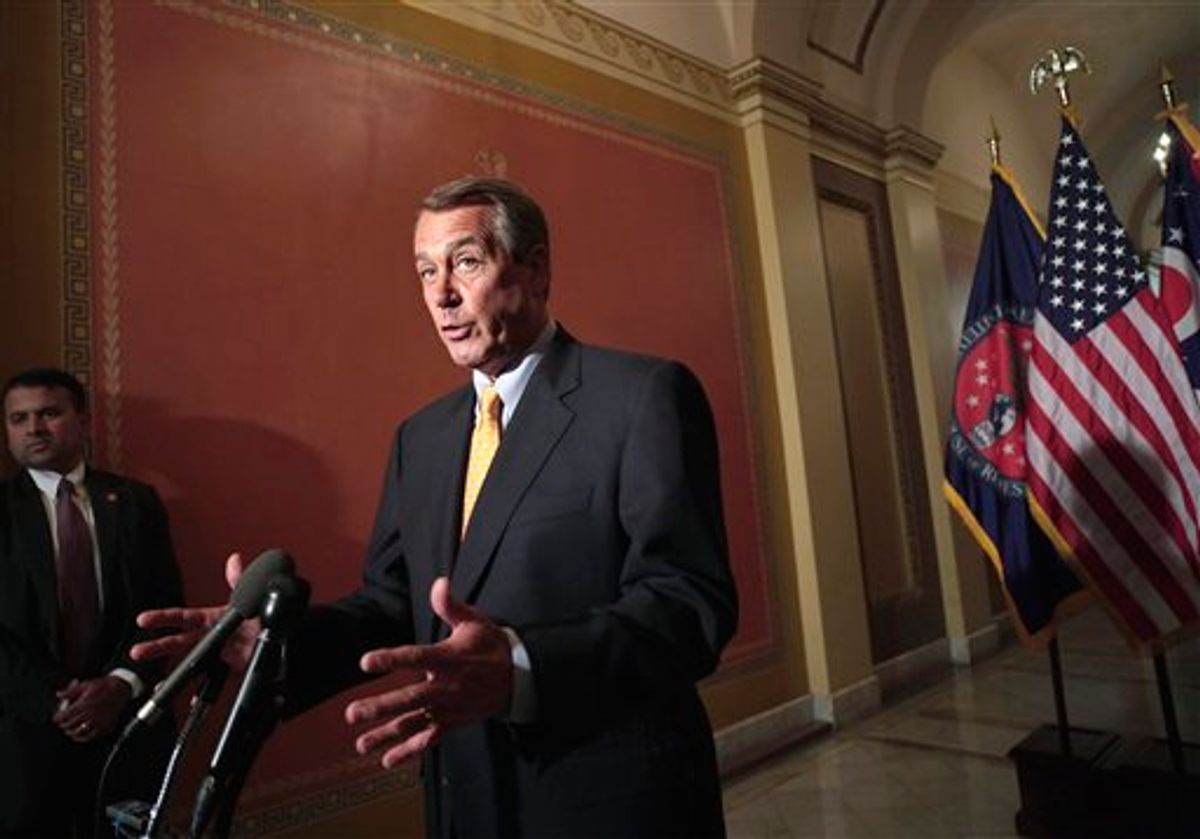Failing to reach agreement in late-night talks at the White House, House Republicans pushed a plan Thursday that would hold off for another week the threat of a government shutdown while Congress and the Obama administration struggle to reach a budget deal. Democrats pressing for a longer-term solution rejected the short-term approach as a political maneuver meant to blame them if the government closes its doors Saturday.
President Barack Obama emerged from the negotiations late Wednesday night to declare that differences between Republicans and Democrats had narrowed somewhat. But at this point only urgent action can avert a shutdown of much of the government at midnight Friday, he said.
Even a brief shutdown could affect a wide range of Americans, from troops fighting abroad who are awaiting their pay to tourists planning trips to national parks.
The move by House Speaker John Boehner, R-Ohio, to advance a one-week interim budget measure angered his Democratic negotiating counterparts and came after negotiations at the White House moved slower than had been hoped.
Thursday's GOP measure would combine a full-year Pentagon budget with a big slice of cuts from domestic programs as the price to keep the government running. Democrats and the White House oppose the idea, preferring to focus on the broader legislation and not forfeit leverage.
"It's going to require a sufficient sense of urgency," Obama said, "to complete a deal and get it passed and avert a shutdown."
Obama told reporters that his differences with the House Republicans were narrowing but not resolved.
"I thought the meetings were frank, they were constructive, and what they did was narrow the issues and clarify the issues that are still outstanding," Obama said. "I remain confident that if we're serious about getting something done, we should be able to complete a deal and get it passed and avert a shutdown. But it's going to require a sufficient sense of urgency from all parties involved."
After the late-night White House session, Boehner said: "We did have a productive conversation this evening. We do have some honest differences, but I do think we made some progress. ... There's an attempt on both sides to continue to work together to try to resolve this."
Boehner's move appeared aimed at shifting political blame if a shutdown occurs, but the announcement of Thursday's vote angered Democrats who felt talks were progressing.
Democrats also said privately that the White House was infuriated after Rep. Jeb Hensarling, R-Texas -- the No. 4 House Republican -- accused Obama of leaving the talks to focus on his re-election campaign in official appearances in Pennsylvania and New York City.
Obama had already ruled out the weeklong measure Republicans intend to push through the House, and Senate Democrats have labeled it a non-starter. Republican officials said the details of the bill could yet change. But passage of any interim measure is designed to place the onus on the Democratic-controlled Senate to act if a shutdown is to be avoided.
At issue is legislation needed to keep the day-to-day operations of federal agencies going through the Sept. 30 end of the budget year. A Democratic-led Congress failed to complete the must-pass spending bills last year, setting the stage for Republicans assuming power in the House in January to pass a measure with $61 billion in cuts that even some GOP appropriators saw as unworkable. It was rejected in the Democratic-controlled Senate.
Meanwhile, Boehner told ABC News in an interview that he's in lockstep with tea partiers demanding severe budget cuts.
"Listen, there's no daylight between the tea party and me," he said. "What they want is, they want us to cut spending. They want us to deal with this crushing debt that's going to crush the future for our kids and grandkids. There's no daylight there."
Separately Wednesday, the White House used its unmatched megaphone to emphasize the stakes involved in the negotiations, arranging a briefing for the presidential press corps on the ramifications of a partial government shutdown.
The officials who spoke did so on condition of anonymity, under rules set by White House aides eager to apply pressure to congressional negotiators.
The officials said military personnel at home and abroad would receive one week's pay instead of two in their next checks. Among those affected would be troops in Iraq, Afghanistan and the region around Libya.
Tax audits would be suspended -- welcome news to some, no doubt -- but there were unhappy tidings for others. Income tax returns filed on paper would pile up at the IRS, and refunds would be delayed as a result.
National parks would close, as would the Smithsonian Institution and its world-class collection of museums clustered along the National Mall within sight of the Capitol. Officials were less clear about the Cherry Blossom Festival, scheduled for this weekend in Washington.
As for the broader talks, it appeared progress had been made on spending cuts demanded by Republicans, though Democrats warned that a series of unrelated GOP policy provisions remain unresolved.
Democrats have already ruled out agreeing to stop funding the year-old health care overhaul or to deny Planned Parenthood all federal money. And Reid has said he will not agree to any of the curbs Republicans want to place on the Environmental Protection Agency.
While the political wheels turned, hundreds of demonstrators rallied outside the Capitol, calling for budget cuts and a shutdown, if necessary, to get them.
"Shut the sucker down," one yelled, and the crowd repeatedly chanted, "Shut it down."



Shares